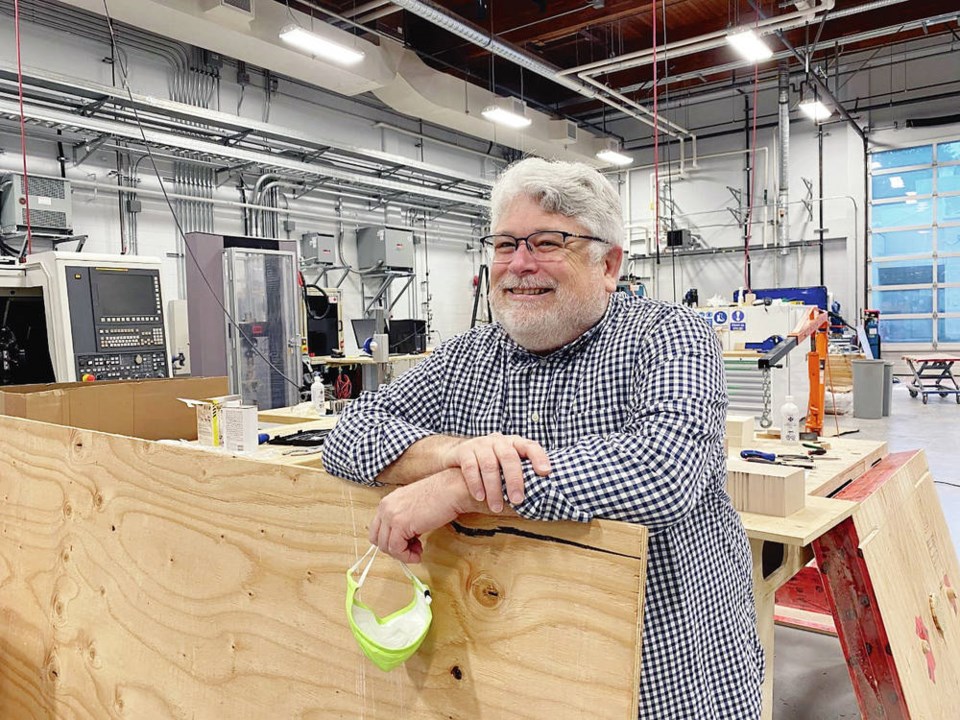Camosun College is so excited about its new, high-end composite lab, it’s calling it “Miracle,” which stands for materials, integration, research and creativity.
The $2.4-million project is part of the Camosun Innovates program, in which the college works with the private sector to custom-design new products for manufacturing. An empty shell at Camosun’s Interurban campus will be renovated to create the 3,600-square-foot lab, expected to be ready in March.
Composites — commonly used these days in airplanes, ships and automobiles — are made up of carbon fibre integrated into plastics, which makes for a very light and strong product, said Richard Gale, director of Camosun Innovates. “There’s no end to what can be created with this material.”
Camosun has been working with composites for years, but did not have a full-time location, Gale said. “There isn’t a lot of teaching space available for composites, so this is a real step forward for us,” he said. “It’s going to give Camosun College and Camosun students a real leg up on the newest work being done in manufacturing on the Island and beyond.”
Developing composite products is somewhat like painting, because layers are added on top of a mold or form, which can be created in the lab as well.
The down side of the lab’s current space is that composite work leads to a lot of off-gassing and uses high heat. “We could only do that after hours because we wanted to be as safe as possible,” said Gale, adding the new lab will be a contained environment with all of the necessary materials in one place.
Students wear special ventilator masks and there is a limit on numbers allowed in at one time, even prior to the pandemic.
The lab has been working with two or three students per year on composites. The new lab will be more integrated into the curriculum, with at least 15 to 20 students per year working in it, Gale said.
Students come from a variety of disciplines, from mechanical engineering to fine arts, nursing and chemistry, he said.
Project costs, including new equipment, will be shared by the Canadian Foundation for Innovation, B.C. Knowledge Development Fund and Camosun.
For about a decade, Camosun has been designing seats made of composite material for para-athletes, Gale said.
“We started this because we had wheelchair athletes and sledge hockey athletes who were using seats that were just basic plastic seats that would break on impact. They needed something that would support their bodies.”
Over time, the seats have become more advanced, he said. Camosun works on the project with the non-profit organization Own the Podium, which helps fund Canada’s para-Olympic athletes.
“We custom-fit every seat to every body,” Gale said, noting about a dozen different seats for athletes in various sports are in the works.
The lab works with other industries, too, and recently made a self-righting boat that was largely composite, Gale said. The unmanned remotely controlled boat, about the size of a dingy, is used to check buoys.
The lab has also turned out pieces of cars for electric vehicles, surfboards and prosthetic devices, said Gale, adding demand is fairly steady.
“Composites is a popular way of approaching manufacturing, but not everybody has the right facilities for it. A lot of times what we will do, we’ll work on a project for a manufacturer to find out if they can do something in a kind of cost-efficient way and then help them set up their own composites lab.
“Our whole reason for being is to help industry envision what they could do and give them a place to look at examples.”
When the new lab is complete, Camosun will hire more staff who specialize in composites, Gale said. “It’s a fascinating technology. It is growing every day and using new materials and new methods.”
Camosun Innovates works with other materials as well. This year it helped to battle the coronavirus, developing a portable device to decontaminate masks and medical-grade face shields.
cjwilson@timescolonist.com



